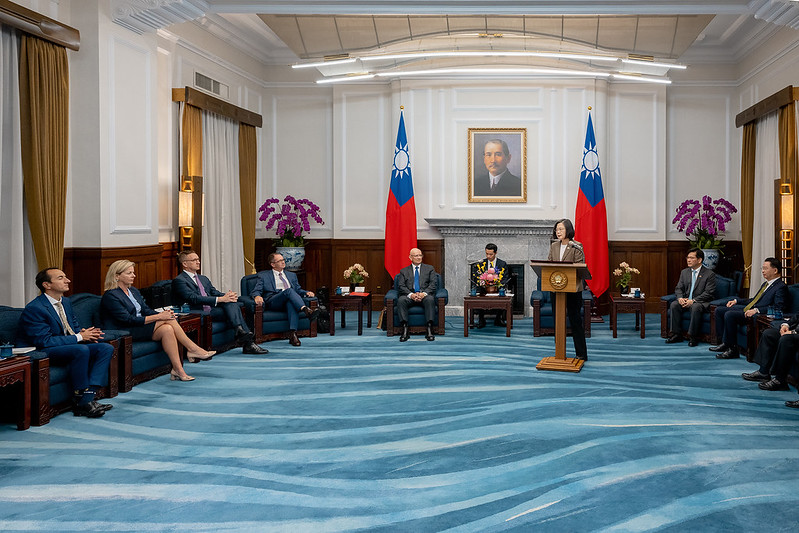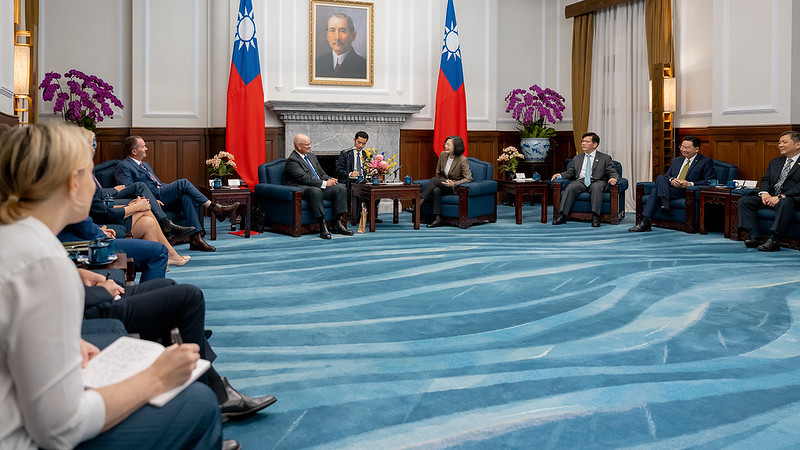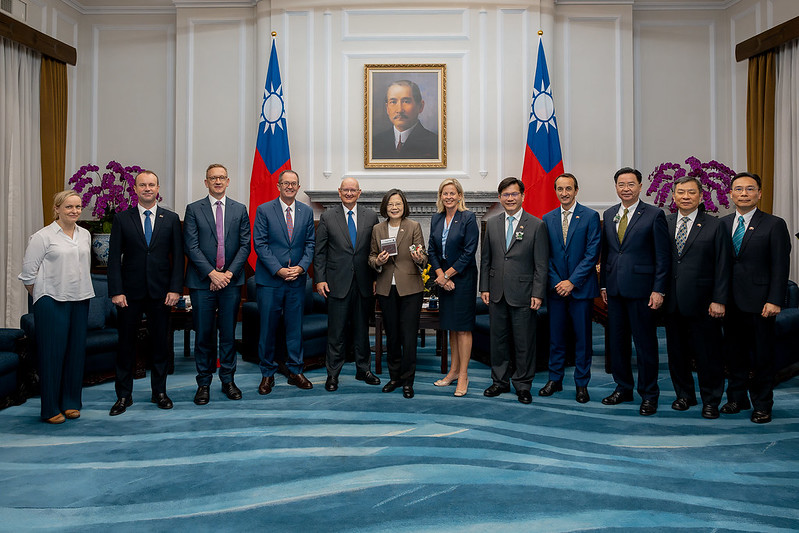News & activities
 News releases
News releases
On the morning of April 8, President Tsai Ing-wen met with a cross-party parliamentary delegation from Australia. In remarks, President Tsai pointed out that Taiwan and Australia are staunch defenders of the values of freedom and democracy, and that our bilateral exchanges and cooperation continue to grow closer. The president expressed gratitude to Australia for continually reaffirming the importance of peace and stability across the Taiwan Strait at bilateral and multilateral forums in recent years. She expressed hope that Australia will support negotiations regarding the signing of an economic cooperation agreement with Taiwan to deepen bilateral economic and trade ties, and that Australia will back Taiwan's bid to join the Comprehensive and Progressive Agreement for Trans-Pacific Partnership (CPTPP) so that together we can advance regional prosperity and development.
A translation of President Tsai's remarks follows:
I would like to welcome the cross-party delegation of Australian parliamentarians led by Members of Parliament Shayne Neumann and Andrew Wallace. This marks the third year in a row that an Australian parliamentarian delegation has visited Taiwan since the COVID-19 pandemic subsided, demonstrating our strong and friendly bilateral relations.
Taiwan and Australia are staunch defenders of the values of freedom and democracy. Our bilateral exchanges and cooperation continue to grow closer, thanks in no small part to the cross-party efforts of the Australian Parliament. After Taiwan's presidential election in January, Mr. Wallace and many other members of the Australian Parliament from multiple parties expressed their support and recognition of Taiwan's democracy through various means.
Last month, under the Global Cooperation and Training Framework, Taiwan and Australia, together with the United States, the United Kingdom, and Japan, held an international workshop on combating transnational fraud. Taiwan and Australia are focused on global issues and jointly respond to common challenges. In recent years, Australia has actively expanded international cooperation through AUKUS and the QUAD. Australia has also continually reaffirmed the importance of peace and stability across the Taiwan Strait at bilateral and multilateral forums. For this, I wish to express my sincere gratitude.
Faced with expanding authoritarianism, democracies today must stand together and bolster cooperation. We hope that Australia will support negotiations regarding the signing of an economic cooperation agreement with Taiwan to deepen bilateral economic and trade ties. We also hope that Australia will back Taiwan's bid to join the CPTPP so that together we can advance regional prosperity and development.
I extend my appreciation to you all for visiting Taiwan. I hope that you will continue to speak up for Taiwan in the Australian Parliament so that we can continue enhancing our bilateral ties and achieve even greater success. I wish you all a pleasant and productive stay.
Member of Parliament Neumann, co-leader of the delegation, then delivered remarks, saying that this is a very experienced delegation led by his friend Andrew Wallace, one of labor and coalition members working together and who are interested in Taiwan. He begun by expressing condolences for the tragic loss of life, injury, and damage caused by the earthquake in eastern Taiwan on the third of April on behalf of the Australian people and the Australian Parliament.
Member of Parliament Neumann said that President Tsai has served the Taiwanese people for eight years with distinction, compassion, and commitment and has been a friend of Australia. As Australian parliamentarians, he said, they have a deep interest in understanding the region and reflecting the interests of the Australian people on their travels. He added that these meetings and the meetings they will have in the next few days are important for understanding the circumstances they face and equipping themselves to meet those challenges.
Member of Parliament Neumann said that they are pleased to be here to learn about our culture and our history, emphasizing its importance. He said that they have people here from Sydney, Melbourne, and southeast Queensland. He noted that in Australia, a very multicultural country, there are many Taiwanese, and that up to about 200,000 of our countrymen and women have studied there.
Noting that we face a military buildup in this region without the transparency and reassurance that one has come to expect from great powers, Member of Parliament Neumann said that Australia is working with its allies and friends to preserve the regional balance here and preserve the status quo for Taiwan. He emphasized that they are against any unilateral actions, and that maintaining the status quo is comprehensively superior to the alternative.
Member of Parliament Neumann said that they are amongst friends and that they know that maintaining the status quo will be challenging, but they wish to reassure us that we are amongst friends. Peace and prosperity, he underlined, are at the center of Australia's ambition for the region. Pointing out that we are both leading Indo-Pacific democracies with a shared objective of an open and stable region, he said that we are working towards that goal through a number of different international fora.
Recognizing that we have deep connections through our economies, people, and culture, Member of Parliament Neumann gave the example of southeast Queensland, where there are many people from Taiwan, particularly in the Brisbane metropolitan area, and into his own electorate. He noted that Australia is the second largest economy in Taiwan's New Southbound Policy and that our integration continues in energy, agriculture, and information and communications technology.
Member of Parliament Neumann said that Australians often make an acknowledgement of country to recognize Indigenous custodians of the land in which they meet and pay respects to their elders. He remarked that Australians are very proud of having the oldest continuous culture in the world and of the contribution that First Nations people have made to their country and history. He recounted that just a few months after he was first elected in 2007, the then Prime Minister Kevin Rudd made a profound national apology, one of the most poignant moments that he has experienced as a parliamentarian. Noting that President Tsai, in her first year in office, did something very similar here in Taiwan, the parliamentarian said that he wants to honor and respect the president for that and realize that the politicians, and our community, area, and society will really appreciate that long-term. Even open, inclusive, and peaceful societies like their own and ours, he said, can make mistakes in their history, and we can learn and strive to do better.
Member of Parliament Neumann stated that Australia and Taiwan are stronger together. He said that they are honored to be here, and that Australia is proud to be Taiwan's partner and friend. He then thanked President Tsai on behalf of the delegation for the meetings they are going to have.
Member of Parliament Wallace, co-leader of the delegation, then delivered remarks, saying that often in Australia when they go on a delegation, they face some resistance from their constituents and that he is sure it is the same in Taiwan. But, he said, not one person objected when he said that he was coming to Taiwan on a delegation. Of course, we are guests of Taiwan, he added, but it shows the warmth of our relationship between our two countries and that everyday Australians see our relationship as very important.
Member of Parliament Wallace said that Australians were genuinely distressed at the news of the earthquake last week. He said that they are saddened and that they bring collectively the thoughts and prayers and the best wishes of the Australian people to our government and the people of Taiwan. He recognized that this is a very distressing time and obviously a very busy time, and that in itself demonstrates how important this relationship is, that the president is giving her time up at such a difficult period.
Noting that our people share a rich history of cooperation, mutual respect, and shared values, Member of Parliament Wallace said that today he will emphasize three critical aspects of our relationship: security, trade, and our people-to-people relationship.
The parliamentarian said that in an ever-changing geopolitical landscape, security cooperation is paramount. He said that Taiwan and Australia both recognize the importance of maintaining peace and stability in the Indo-Pacific region, and that our strategic partnership contributes significantly to regional security. Noting that Taiwan and Australia both have a vested interest in a rules-based, open, and inclusive Indo-Pacific, he said that we stand united against any threats to regional stability.
In defense cooperation, the parliamentarian said, our defense forces engage in joint exercises and intelligence-sharing and capacity-building programs. In fact, he mentioned, Australia along with the US, Japan, and the Philippines are conducting naval exercises as we speak in the South China Sea.
Remarking that as technology evolves, so do our security risks, the parliamentarian said that Taiwan and Australia collaborate on cybersecurity initiatives safeguarding our critical infrastructure and our important digital networks. In terms of trade, he said that Taiwan is Australia's seventh-largest trading partner, with two-way trade in 2022-2023 equating to AU$41.5 billion. He added that Australia remains a reliable supplier of energy and resources to Taiwan. Then, the parliamentarian said that our people-to-people links are also incredibly important through cultural ties.
Member of Parliament Wallace said that the Taiwan-Australia relationship transcends mere diplomatic channels; it embodies shared values, resilience, and a commitment to a prosperous and secure future. As we navigate the complexities of our region, he said, let us continue to build bridges, foster understanding, and champion cooperation. In closing, the parliamentarian expressed his hope that our enduring relationship may flourish for many generations to come.
The delegation also included Members of Parliament Julian Hill and Angie Bell and Senator Dave Sharma and was accompanied to the Presidential Office by Australian Office in Taipei Deputy Representative Daniel Stuart.












